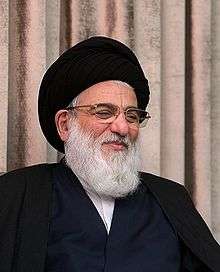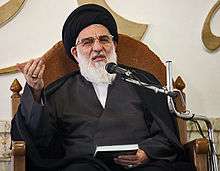Mahmoud Hashemi Shahroudi
| Mahmoud Hashemi Shahroudi | |
|---|---|
 | |
| Chief Justice of Iran | |
|
In office 30 June 1999 – 30 June 2009 | |
| Appointed by | Ali Khamenei |
| Preceded by | Mohammad Yazdi |
| Succeeded by | Sadeq Larijani |
| Chairman of the Assembly of Experts Acting | |
|
In office 21 October 2014 – 10 March 2015 | |
| Preceded by | Mohammad Reza Mahdavi Kani |
| Succeeded by | Mohammad Yazdi |
| Member of Assembly of Experts | |
|
Assumed office 24 February 1999 | |
| Constituency | Razavi Khorasan Province |
| Majority | 1,499,109[1] |
| Personal details | |
| Born |
September 1, 1948 Najaf, Iraq |
| Citizenship | Iranian and Iraqi[2] |
| Political party | Islamic Dawa Party |
| Religion | Twelver Shia Islam |
| Website | Personal website |
Mahmoud Hashemi Shahroudi (Persian: محمود هاشمی شاهرودی, born 1 September 1948) is a moderate[3] Iranian politician and Shia Marja.[4][5][6] He is currently First Vice-Chairman of the Iranian Assembly of Experts.[7] According to Al-Monitor, he is also an Iraqi citizen and a former member of Islamic Dawa Party.[2]
Shahroudi’s official English-language biographical information from the Iranian Assembly of Experts' website opens with his education received in Najaf, Iraq from Muhammad Baqir al-Sadr, the Islamic Dawa Party Founder, and takes the view that al-Sadr was martyred;[8] al-Sadr was executed without trial by Saddam Hussein’s regime in April 1980.[9]
Hashemi Shahroudi became the leader of the Supreme Council for the Islamic Revolution in Iraq, which has caused objections to his serving as the Head of Iran's Judiciary from 1999 until 2009. He is currently a member of Iran's Guardian Council.[10]
Upon accepting his position as the Head of Iran’s Judiciary, Shahroudi proclaimed: "I have inherited an utter ruin from the previous judiciary," referring to Mohammad Yazdi's 10 years in office.[11][12] He appointed Saeed Mortazavi, a well known fundamentalist and controversial figure, prosecutor general of Iran. Later when Mortazavi led the judiciary against Khatami's reform movement, Shahroudi was prevented by regime hardliners from stopping Mortazavi's violent acts against dissidents or removing him from power.[13] In July 2011 Shahroudi was appointed by Supreme Leader Ali Khamenei to head an arbitration body to resolve an ongoing dispute between Mahmoud Ahmadinejad and the parliament.[14] He is favorite as one of the successors of Ali Khamenei as Supreme Leader of Iran.
Appointment as Chief Justice
Career in juridical power
After khamenehi became leader of Islamique republic, Ayatollah Yazdi has served as the president of the Supreme Court. He remained in the post for many years and then replaced by Muhammad Hashemi shahreoudi.[15]
Prosecution of parliament members
In 2001, the judiciary prosecuted several reformist members of parliament for speeches and activities they had carried out in their capacity as MPs. The Iranian constitution grants immunity to members of parliament during their tenure, and the courts have no right to put MPs on trial for speeches given in parliament. The incident led to a major conflict between Iranian president Mohammad Khatami and Chief of Judiciary Hashemi Shahroudi. In a letter, Khatami protested the courts' prosecution of MPs, insisting the act contravened the political immunity which the Iranian Constitution has provided for the deputies. The notice prompted Hashemi Shahroudi to respond, calling Khatami's letter "a surprise." "Since judges, according to the Constitution and ordinary laws as well as the jurisprudential principles, are independent in their interpretation of the law and issuing verdicts, nobody -- not even the judiciary chief -- has the right to impose its interpretation of the law on judges," Shahroudi said in part of his letter to President Khatami.[16] Shahroudi denounced reformist MPs, stating they weakened parliament by defending "westernized" journalists and other liberals.[17] While the Iranian constitution does state in Art. 167 that judges need to adjudicate on the basis of Islamic sources in cases where no codified law exists, this was clearly not the case with regard to immunity of standing members of parliament. Shahroudi's commentary must be interpreted as being politically motivated, and is symptomatic of his failure to strengthen the rule of law during his tenure.
Decriminalization Bill
The decriminalization bill (in Persian: تعيين مجازاتهای جايگزين) refers to a legal bill submitted by the Iranian Judiciary to the parliament. It aims at substituting imprisonment and execution by educational workshops and social penalties. The bill is considered one of the most important legal bills prepared by the Iranian judiciary during Shahroudi's tenure.
According to the bill, for all minor crimes, whose punishment is less than six months of imprisonment, imprisonment will be substituted with social penalties. This category of crimes include crimes related to traffic, environmental, medical, family, cultural and hunting offenses. The bill also demands that criminals undergo an educational or skill training course convened by the judiciary system.[18][19]
The bills also addresses the crimes conducted by minors in the three age categories 7-12, 12-15 and 15–18 years old. It is reminiscent to the Iranian criminal law of 1925. According to the bill, minors can no longer be executed. The bill is based on several years of continuous discussion with religious scholars at the seminaries.[20][21]
According to the bill, the crimes conducted by children of 7–12 years old is not punishable. For the age categories 12-15 and 15-18, imprisonment is replaced by mandatory training and education programs. For the age category of 15-18, execution is applied for crimes like murders if and only if the judge is confident that the criminals are mentally developed as adults and the crime is conducted intentionally and with a well-thought-out-plan. However, both teenagers and young adults (older than 18) with low mental development, cannot be sentenced to death.[22]
In 2009, the bill was approved by the judiciary commission of the Iranian parliament. The bill will be ratified after the approval of the parliament and the guardian council.
Shahroudi is most notable in the West for instituting Iran's 2002 moratorium on stoning as a form of capital punishment. The penalty remains on the books however, leaving open the possibility that the moratorium could again be overturned as it was in 2006 and 2007.[23][24][25][26]
2009 Bill on Iran's Bar Association
In 2009, Shahroudi offered a bill to the Iranian parliament that targets the independence of Iran's Bar Association.[27][28] According to this bill, lawyers will be watched by the Iranian ministry of Intelligence and their credentials depend on the approval of the intelligence service.
Restriction of media

In 2009, Shahroudi issued an order to restrict people's access to Iranian Satellite TV Channels and to prosecute staff of Satellite TV Channels whose opinion is not in line with that of the Islamic Republic.[29] People who support these channels and internet users who act not according to the line of the constitution, can be punished with up to five years of imprisonment.
Current activities and views
In July 2011, Shahroudi was appointed by the Supreme Leader Ali Khamenei to head an arbitration body to resolve an ongoing dispute between president Ahmadinejad and parliament. The five-member body Shahroudi heads is made up of "hard-liners known for their opposition to any reforms within the ruling system", according to the Associated Press news agency.[14] The appointment was seen as a move to sideline or weaken former President Hashemi Rafsanjani who heads the Expediency Council, a body set up to arbitrate disputes within the ruling system in the Islamic Republic.[14] Rafsanjani had alienated Khamenei and the Islamic establishment with "his tacit support" for opposition to the controversial June 2009 presidential elections results that re-elected president Ahmadinejad.[14]
Shahroudi has denounced ISIL as a terrorist organization that commits the worst sins of killing people in the name of jihad even though ISIL’s killings are clear violations of Islam. Sharoudi has also denounced ISIL for wrecking the infrastructure of civilizations and countries, and for committing murder.[30]
Criticism
Shahroudi has received criticism from a number of Iranian scholars and lawyers. Mostafa Mohaghegh Damad, a well known Iranian scholar and expert on Islamic law, wrote a letter of criticism in August 2009.[31][32][33]
See also
References
- ↑ "Assembly of Experts members" (in Persian). Assembly of Experts. Retrieved 28 October 2014.
- 1 2 Bordbar, Behdad (2014-06-26). "Who will be Iran's next supreme leader?". Al-Monitor. Retrieved 2015-03-10.
- ↑ Hardliners delay Khatami's inauguration The Independent
- ↑ اعلام مرجعیت آیت الله هاشمی شاهرودی Farda News
- ↑ هاشمی شاهرودی اعلام مرجعیت کرد Aftab News
- ↑ ورود رسمی آیت الله هاشمی شاهرودی به جرگه مرجعیت
- ↑ "Seyyed Mahmoud Hashemi Shahroudi(First vice_chairman)". Official website of the Assembly of Experts. Retrieved 9 June 2016—>Management Committee of [the] Assembly of Experts. Check date values in:
|access-date=(help) - ↑ "The Secretariat Assembly of Experts for Leadership—>Assembly of Experts Representatives—>Hashemi-Shahroudi Seyyed Mahmoud". Archived from the original on 20 May 2016. Retrieved 20 May 2016.
- ↑ Augustus R. Norton (19 January 2009). Hezbollah: A Short History. Princeton University Press. p. 30. ISBN 978-0-691-14107-7. Retrieved 9 August 2013.
- ↑ Ayatullah Haj Sayyid Mahmoud Hashimi Shahroudi page on Al-Shia.org
- ↑ "Shahroudi says Iran's Judiciary in need of reform". Payvand. Retrieved 7 September 2010.
- ↑ "Letter". Savedelara. Retrieved 7 September 2010.
- ↑ http://www.middle-east-online.com/english/?id=41147
- 1 2 3 4 Iran's top leader names mediator in power struggle By Ali Akbar Dareini|Associated Press|25 July 2011
- ↑ David Menashri (2001). post revolutionary politics In iran. Frank Cass. p. 48.
- ↑ "Parliament speaker reiterates Khatami's constitutional rights". Payvand.com. Retrieved 2010-09-07.
- ↑ "Reformist Islamic Revolution Mujahideen Organization rues Shahroudi's response to majlis". Netnative.com. Retrieved 2010-09-07.
- ↑ Archived 4 December 2008 at the Wayback Machine.
- ↑ "وکالت - لایحه مجازات های اجتماعی جایگزین زندان". Vekalat1.mihanblog.com. Retrieved 2010-09-07.
- ↑ Copyright: gooya.com 2010. "gooya news :: politics : جمشيدی: صابری در سلامت کامل است، مطبوعات باعث اعدام دلآرا دارابی شدند، رويه جديد قوه قضائيه در جلوگيری از اعدام کودکان، ايلنا". News.gooya.com. Retrieved 2010-09-07.
- ↑ "de beste bron van informatie over iran street children. Deze website is te koop!". Iranstreetchildren.com. Retrieved 2010-09-07.
- ↑ "خبرنامه امیرکبیر-پایگاه خبری تحلیلی دانشجویان دانشگاه صنعتی امیرکبیر » آرشیو » مصاديق جرم سياسي در لايحه جديد تعزيرات". Autnews.ws. Retrieved 2010-09-07.
- ↑ "IRAN: Stoning: a return to barbarity". FIACAT - Federation International, Action by Christians for the Abolition of Torture. Retrieved 2009-07-09.
- ↑ Public Statement MDE 13/083/2007 (2007-07-09). "Iran: Amnesty International outraged at reported stoning to death and fears for victim's co-accused". Amnesty international. Retrieved 2009-07-09.
- ↑ Commissioner Ferrero-Waldner (2007-07-13). "Commissioner Ferrero-Waldner on the stoning to death of Mr Jafar Kiani". European Commission. Retrieved 2009-07-09.
- ↑ The Honourable Peter MacKay, Minister of Foreign Affairs and Minister of the Atlantic Canada Opportunities Agency (2007-07-11). "Canada Condemns Execution by Stoning of Jafar Kiani in Iran". Government of Canada. Retrieved 2009-07-09.
- ↑ "Iranian Bar Associations". Iranbar. Retrieved 7 September 2010.
- ↑ "Iranian Bar Associations". Iranbar. Retrieved 7 September 2010.
- ↑ BaniComm Co. "ISNA - 07-05-2009 - 88/4/14 - سرويس: / فقه و حقوق - حقوق سياسي / شماره خبر: 1366015". Isna.ir. Retrieved 2010-09-07.
- ↑ Staff writer(s); no by-line. (6 June 2016). "هاشمی شاهرودی: هیچکس حق ندارد وحدت اسلام را زیر پا بگذارد" [Hashemi Shahroudi: No one has the right to violate Islamic unity]. Aftab (in Persian). Retrieved 9 June 2016.
- ↑ "آفتاب - محققداماد خطاب به شاهرودی: کاش در حوزه مانده بودید". Aftab News. Retrieved 7 September 2010.
- ↑ "Iran is self-destructing". Weekly Ahram. 19 September 2009. Retrieved 7 September 2010.
- ↑ http://www.washingtoninstitute.org/templateC05.php?CID=3105
External links
- JUDICIARY BOSS TELLS PRESIDENT MIND YOUR OWN BUSINESS
- Hashemi Shahroudi opposing President Khatami's actions
- The Moving Report on the Judiciary System, from Mohammad Ali Abtahi's weblog (in Persian)
- Shahroudi harshly criticized Iranian police and some hard-line judges (in Persian)
| Legal offices | ||
|---|---|---|
| Preceded by Mohammad Yazdi |
Chief Justice of Iran 1999–2009 |
Succeeded by Sadeq Larijani |